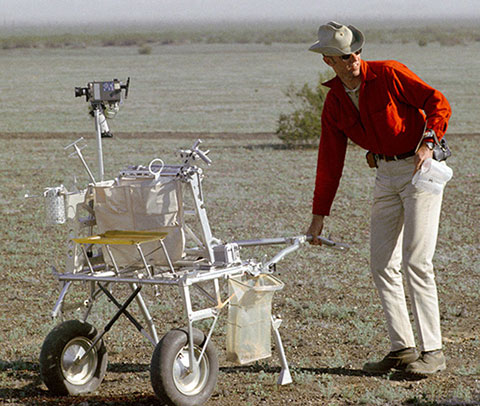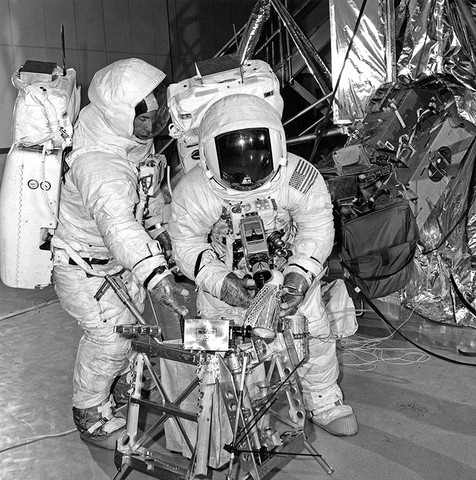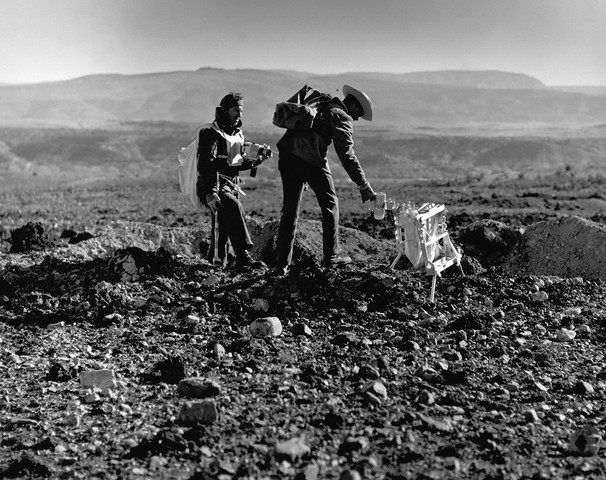|
Author
|
Topic: Photo of the week 643 (February 18, 2017)
|
heng44
Member Posts: 3387
From: Netherlands
Registered: Nov 2001
|
 posted 02-18-2017 02:24 AM
posted 02-18-2017 02:24 AM
   
 Space cowboy and Apollo 14 backup LMP Joe Engle is parking a mockup of the Mobile Equipment Transporter (MET) during geologic training at Sierra Pinacate, a group of volcanic peaks and cinder cones in Mexico in February 1970. |
Mike Dixon
Member Posts: 1397
From: Kew, Victoria, Australia
Registered: May 2003
|
 posted 02-18-2017 05:29 AM
posted 02-18-2017 05:29 AM
   
Wonder what happened to that little unit? |
Philip
Member Posts: 5952
From: Brussels, Belgium
Registered: Jan 2001
|
 posted 02-18-2017 10:18 AM
posted 02-18-2017 10:18 AM
   
Great color photo of the geology training in the Sonora state! |
micropooz
Member Posts: 1512
From: Washington, DC, USA
Registered: Apr 2003
|
 posted 02-18-2017 11:45 AM
posted 02-18-2017 11:45 AM
   
quote:
Originally posted by Mike Dixon:
Wonder what happened to that little unit?
The cynic in me says it probably got sold as government surplus and spent the rest of its life hauling bags of fertilizer around someone's garden...  |
cmj1964
Member Posts: 11
From: Broomfield, Colorado, USA
Registered: Mar 2013
|
 posted 02-18-2017 12:44 PM
posted 02-18-2017 12:44 PM
   
The National Air and Space Museum may have this training MET. |
MCroft04
Member Posts: 1634
From: Smithfield, Me, USA
Registered: Mar 2005
|
 posted 02-18-2017 04:27 PM
posted 02-18-2017 04:27 PM
   
At the Astronaut Scholarship Foundation's STS-1 and 2 35th anniversary celebration, Engle told Dan Brandenstein that his favorite part of astronaut training was the geology training. I was fortunate to sit with General Engle at the ASF November show, so I asked him why he enjoyed the geology training. He said that he liked everything, especially traveling to exotic places like the Grand Canyon and Iceland for geology training. Great photo Ed! |
Jonnyed
Member Posts: 396
From: Dumfries, VA, USA
Registered: Aug 2014
|
 posted 02-19-2017 11:18 AM
posted 02-19-2017 11:18 AM
   
The only thing the MET is missing in that photo is a bag of golf clubs. |
Ken Havekotte
Member Posts: 2915
From: Merritt Island, Florida, Brevard
Registered: Mar 2001
|
 posted 02-19-2017 12:56 PM
posted 02-19-2017 12:56 PM
   
...along with a 100'-rolled up lunar surface safety line that was detached from the MET and brought back to earth (used for an Apollo 14 souvenir laminated card project). |
carmelo
Member Posts: 1047
From: Messina, Sicilia, Italia
Registered: Jun 2004
|
 posted 02-19-2017 06:04 PM
posted 02-19-2017 06:04 PM
   
Apollo 13 had the MET? |
Mike Dixon
Member Posts: 1397
From: Kew, Victoria, Australia
Registered: May 2003
|
 posted 02-19-2017 08:58 PM
posted 02-19-2017 08:58 PM
   
I believe it did... to the best of my knowledge. |
Robert Pearlman
Editor Posts: 42988
From: Houston, TX
Registered: Nov 1999
|
 posted 02-19-2017 10:29 PM
posted 02-19-2017 10:29 PM
   
It's not conclusive, but the Apollo 13 press kit makes no mention of the MET; the Apollo 14 kit does. And the MET Operator's Familiarization Manual is dated April 27, 1970, which would be too late for Apollo 13 (though maybe there was an earlier edition). |
Mike Dixon
Member Posts: 1397
From: Kew, Victoria, Australia
Registered: May 2003
|
 posted 02-20-2017 03:03 AM
posted 02-20-2017 03:03 AM
   
That's one of those other questions I guess for Fred or Jim. Based on the landing point to Cone Crater, I think I remember reading something about a cart as a solution given the potential distance back to the LM. I was only 15 at the time but pretty much hooked in it. |
Andy Anderson
Member Posts: 82
From: Perth, Australia
Registered: Dec 2009
|
 posted 02-20-2017 05:05 AM
posted 02-20-2017 05:05 AM
   
I always thought that the surface activities of Apollo 14 were basically a repeat of what had been planned for Apollo 13. But maybe not, as I can find no mention of a MET.The following is from the Apollo 13 Lunar Trajectory Notes, which seems a strange place to have surface activities recorded... for the second EVA: The CDR proceeds to retrieve the second SRC from the pad where it was left on the previous EVA. It is placed on the MESA SRC table, clamped, and opened. The LMP brings the hand tool carrier close by the MESA as the CDR unpacks another 35 bag dispenser, a set of three core tubes, three special sample containers, a new pair of weigh bags, and a solar wind experiment bag. The weigh bags and the solar wind bag go on the MESA; the dispenser and core tubes go on the HTC.Next the HTC receives its complement of tools, including a large two-piece hoe/shovel for use in digging trenches. The vertical-seeking photo-graphy reference tool, the gnomon, is also taken off the MESA and stowed on the HTC. Both crewmen proceed to install the PLSS-mounted packs, called tote bags, on each other. The LMP's carry pouch (a pocket attached to the tote bag) contains the 100-foot safety tether, a filter, and the special sample containers. The CDR's pouch receives the extra 70mm and 16mm film magazines. While the CDR was loading the HTC, the LMP retrieved the closeup stereo camera (CSC) from its place in the sun where it rested between EVAs, deployed the skirt, or light shroud, and took some trial pictures in the vicinity of the LM. The CDR will nominally hand-carry this unit out on the geology traverse. Both crewmen check the HTC and their packs for completeness. The surface sequence (16mm) camera is stowed in the HTC pouch. The traverse map is placed in a special pocket on the HTC. The HTC is usually carried by the LMP. The crewmen then proceed to assemble the large scoop to the extension handle, take one of the two spare weigh bags (stowed in the ETB at launch), and go to a representative area of ground near the LM. The large scoop has a 0.5-cm sieve attachment. The crewmen sieve material for 5 minutes and deposit residual rocks and chips in the weigh bag. This bag is sealed and stowed in the ETB. The crew proceeds to calibrate their film (black and white SO-267) and obtain photometric data by taking a series of photographs of a special contrast chart carried on the HTC. These are photos I believe of the HTC — "Hand Tool Carrier" — used in training for Apollo 13 but without the "benefit" of a MET. 
|
LM-12
Member Posts: 3208
From: Ontario, Canada
Registered: Oct 2010
|
 posted 02-20-2017 07:22 AM
posted 02-20-2017 07:22 AM
  
Appendix A in the Apollo 14 Mission Report describes "the changes made to the command and service modules, the lunar module, the extravehicular mobility unit, the lunar surface experiment equipment, and the launch vehicle since the Apollo 13 mission" starting on page A-1.The MET is described on page A-6:
A modular equipment transporter was attached to the modular equipment stowage assembly in quadrant 4. This system was provided to transport equipment and lunar samples, and to serve as a mobile workbench during extravehicular activities. The transporter was constructed of tubular aluminum, weighed 25 pounds, and was designed to carry a load of about 140 pounds, including about 30 pounds of lunar samples. |















